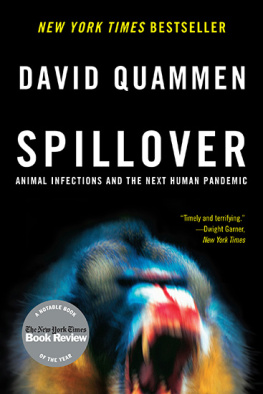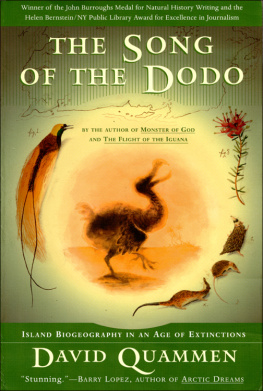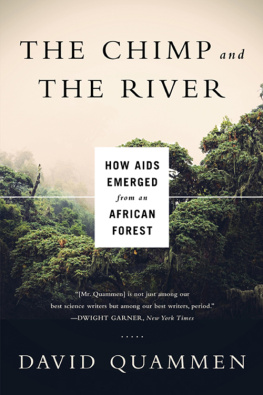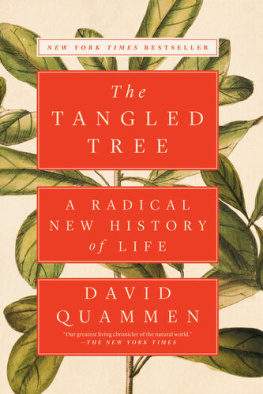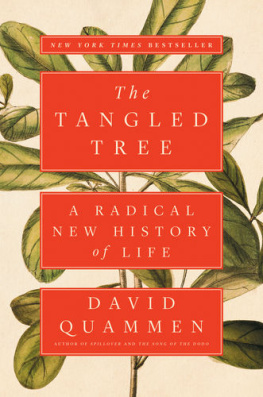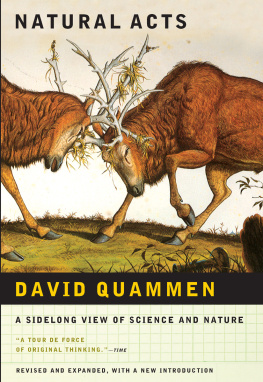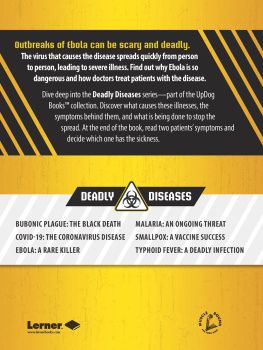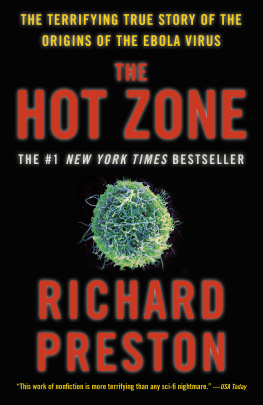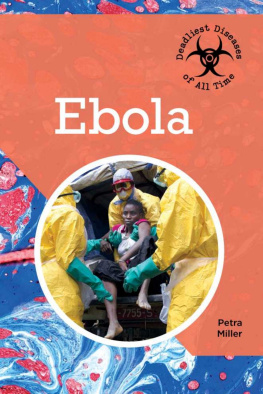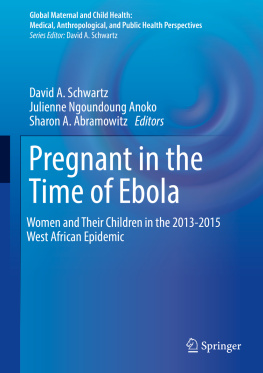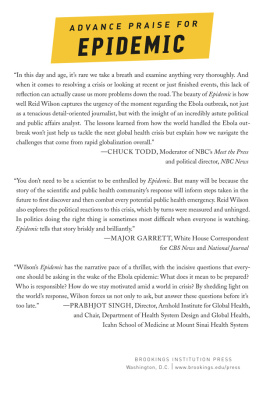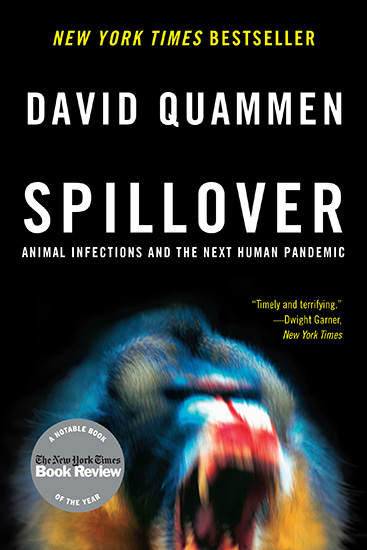Contents
About the Author
David Quammen is an author and journalist who travels widely to some of the remotest corners of the earth. He writes for a broad range of publications such as Harpers, Esquire, The Atlantic, Rolling Stone and the New York Times , and is a Contributing Writer at National Geographic . His journalism has won him three National Magazine Awards, and he is the recipient of the Academy Award in Literature from the American Academy of Arts and Letters.
Quammen is the author of several acclaimed science and natural history titles, as well as a number of novels. His most recent book, Spillover , from which this book is largely extracted, is an exploration into how some of the worlds most deadly viruses crossed over from non-human animals into humans. Spillover won the Science and Society Book Prize, from the National Association of Science Writers in the United States, and the Society of Biology Book Award in the United Kingdom.
Mdecins sans Frontires (Doctors without Borders) and a few other organizations are providing crucial health care and support, in complement to national and local health authorities, within the countries afflicted by the 2014 West African outbreak.
To learn more about MSFs role or to make a donation, go to:
http://www.doctorswithoutborders.org/our-work/medical-issues/ebola
NONFICTION
Spillover
The Reluctant Mr. Darwin
Monster of God
The Song of the Dodo
ESSAYS
Natural Acts
The Boilerplate Rhino
Wild Thoughts From Wild Places
The Flight of the Iguana
FICTION
Blood Line
The Soul of Viktor Tronko
The Zolta Configuration
To Walk the Line
EDITED
On the Origin of Species: The Illustrated Edition
The Best American Science and Nature Writing 2000, with Burkhard Bilger
Ebola was extracted and adapted from
Spillover: Animal Infections and the Next Human Pandemic
Available now wherever books are sold
Ebola
The Natural and Human
History of a Deadly Virus
DAVID QUAMMEN
Copyright 2014, 2012 by David Quammen
Extracted from Spillover: Animal Infections and the Next Human Pandemic, updated and with additional material.
Web addresses appearing in this book reflect existing links as of the date of first publication. No endorsement of, or affiliation with, any third party website should be inferred. W. W. Norton & Company, Inc. is not responsible for third party content (website, blog, information page, or otherwise).
All rights reserved
For information about permission to reproduce selections from this book, write to Permissions, W. W. Norton & Company, Inc., 500 Fifth Avenue, New York, NY 10110
For information about special discounts for bulk purchases, please contact W. W. Norton Special Sales at specialsales@wwnorton.com or 800-233-4830
Production manager: Julia Druskin
ISBN 978-0-393-35155-2 (pbk.)
ISBN 978-0-393-35156-9 (e-book)
W. W. Norton & Company, Inc.
500 Fifth Avenue, New York, N.Y. 10110
www.wwnorton.com
W. W. Norton & Company Ltd.
Castle House, 75/76 Wells Street, London W1T 3QT
During the spring and summer of 2014, people around the world have watched with concern, appalled fascination, sympathy, and no small amount of personal fear as an outbreak of Ebola virus disease (EVD) has unfolded and spread among three troubled countries in West AfricaGuinea, Liberia, Sierra Leoneand then made a disconcerting leap, by airplane, to Nigeria. Having smoldered for months, killing victims by the dozens, it flamed in August of that year and began stacking up mortalities, week by week, in the hundreds. By then it had become the worst Ebola outbreak in the history of this peculiar, disconcerting disease. The story of the 2014 outbreak was so rivetingly awful that it competed for headline space with contemporaneous events in Syria, Ukraine, and the Gaza Strip.
But an outbreak of Ebola is very different from the dire realities of politics and war: more ineffable, more spooky. Ebola virus is invisible, except through an electron microscope or by way of its pathogenic effects. It is impersonal. It is apolitical. It seems to kill like the tenth plague of Egypt in Exodusthe one inflicted by an angel of death.
This last impression is misleading. Ebola is no death angel; its mystifying but not preternatural. Its just a virusalbeit a virus that, inconspicuous elsewhere, tends to be hellaciously destructive when it gets into a human body.
Every newly emerging infectious disease, EVD included, begins as a mystery story. The mysteries are several. Whats causing the sudden explosion of misery and death? If its a virus, what sort of virus? Has science ever seen anything like it? Where has it come from? Any virus must abide in a living creature, in order to replicate and survive over time, so which creature? And how has it moved from that creature into humans? Can the new virus be controlled? Can it be battled with pharmaceutical therapies or vaccines? Can it be stopped? Or is this outbreak going to be the Next Big One, a catastrophic pandemic, destined to sweep around the world and kill some sizable fraction of the human population, like the Black Death of the fourteenth century or the influenza of 1918? Disease scientists and public health officials are the intrepid investigators, the Sam Spades and Philip Marlowes and Detective Chief Inspector Jane Tennisons, who muster out to address these mysteries. In the case of Ebola, they have solved some but not all.
This little volume, excerpted and adapted from my 2012 book Spillover, with some additional material, is an attempt to place the 2014 West Africa outbreakand a separate independent outbreak, which has recently flared in the Democratic Republic of the Congowithin a broader context that makes sense of those mysteries and their partial solutions. My offering here is merely a partial view of the history and science of Ebola, and a somewhat personal one, which has grown from my own modest travels through Ebola habitat, and from a chance encounter in the forest with two men who had seen the virus at its worst, killing their friends and loved ones. (To be clear: I myself have never had that harrowingly instructive experience, and I have not visited West Africa to observe or report on the current outbreak.) I also include here some treatment of Marburg virus, for two reasons: because it is closely related to Ebola virus, within the filovirus family, and because certain important questions that remain unanswered about Ebola virus have been answered for Marburg, as youll see, suggesting valuable (though guarded) inferences about Ebola itself.
Ebola virus disease has been mostly an African affliction (so far), and although its unique, it is no anomaly. It just represents an especially dramatic version of a global phenomenon.
Everything comes from somewhere, and strange new infectious diseases, emerging abruptly among humans, come mostly from nonhuman animals. The disease might be caused by a virus, or a bacterium, or a protozoan, or some other form of dangerous bug. That bug might live inconspicuously in a kind of rodent, or a bat, or a bird, or a monkey, or an ape. Crossing by some accident from its animal hideaway into its first human victim, it might find hospitable conditions; it might replicate aggressively and abundantly; it might cause illness, even death; and in the meantime, it might pass onward from its first human victim into others. Theres a fancy word for this phenomenon, used by scientists who study infectious diseases from an ecological perspective:
Next page
